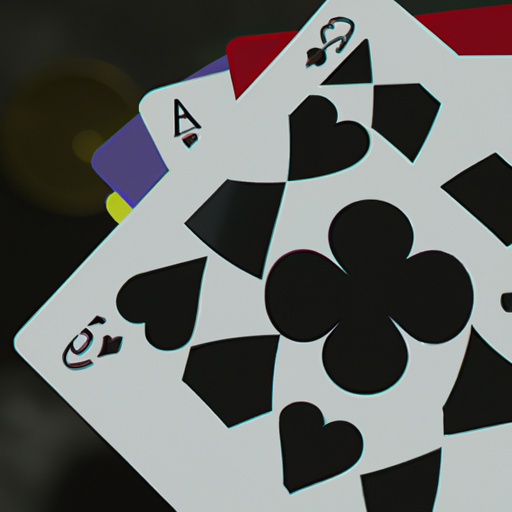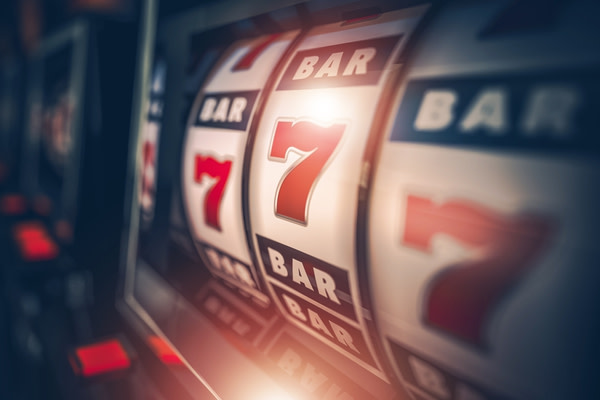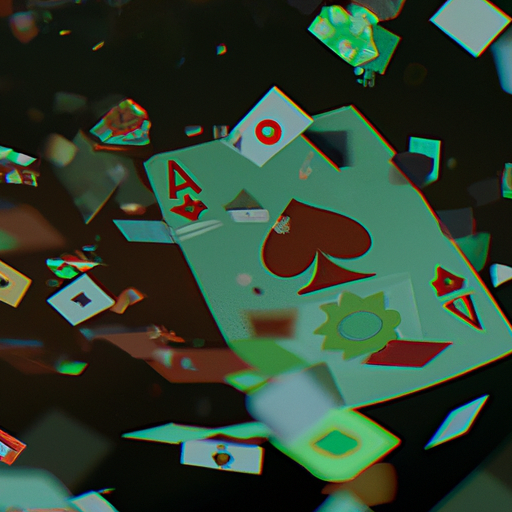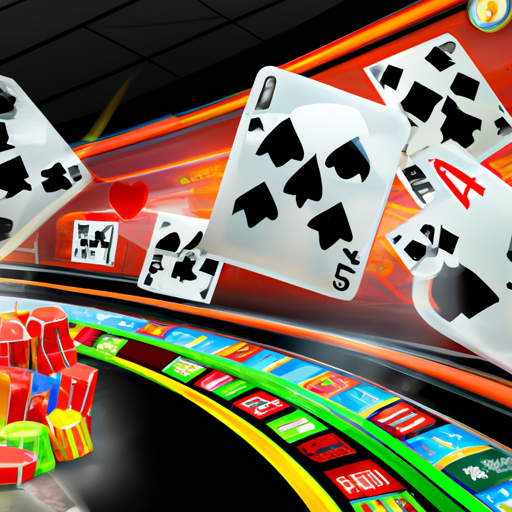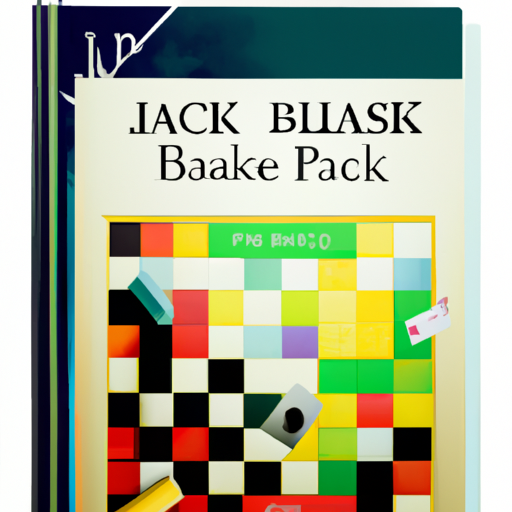
-
TopCasino Slots On-line Slots, Blackjack, Roulette, Betting & Gambling Evaluations & Guides: TOC
- Introduction
- Understanding the Basics of Probability Theory in Blackjack
- The Importance of Probability Theory in Developing a Winning Blackjack Strategy
- How to Use Probability Theory to Calculate Your Odds of Winning at Blackjack
- The Role of Probability Theory in Making Informed Decisions at the Blackjack Table
- Using Probability Theory to Determine When to Hit, Stand, Double Down or Split in Blackjack
- The Impact of Variance on Your Blackjack Strategy and How Probability Theory Can Help You Manage It
- The Relationship Between Card Counting and Probability Theory in Blackjack
- How to Incorporate Probability Theory into Your Betting Strategy for Maximum Profitability in Blackjack
- The Pros and Cons of Using a Progressive Betting System Based on Probability Theory in Blackjack
- Exploring the Different Types of Probabilities Involved in Playing Blackjack
- The Role of Conditional Probability in Advanced Blackjack Strategies
- Using Bayesian Inference to Improve Your Decision-Making Skills at the Blackjack Table
- How Monte Carlo Simulation Can Help You Test Your Blackjack Strategies Based on Probability Theory
- The Future of Probability Theory and Its Impact on the Evolution of Blackjack Strategy
- Common Misconceptions About Probability Theory and How They Affect Your Approach to Playing Blackjack
- Q&A
- Conclusion
"Grasp the odds and beat the seller with probability principle in Blackjack Strategy."
Introduction
Probability principle plays a essential position in growing efficient Blackjack methods. By understanding the possibilities of certain outcomes, gamblers can make knowledgeable choices about when to hit, stand, or double down. This data also can assist gamblers decide when it is advantageous to place bigger bets or take insurance. In this article, we will discover how probability principle will be utilized to blackjack Strategy and enhance a player's chances of winning at the desk.
Understanding the Basics of Probability Theory in Blackjack
Blackjack is a popular casino game that has been around for hundreds of years. It's a game of ability and strategy, the place gamblers try to beat the seller by getting a hand value of 21 or as close to it as attainable with out going over. One of the key components of profitable blackjack play is knowing probability principle.
Probability principle is the department of arithmetic that deals with the probability of occasions occurring. In blackjack, probability principle will be used to find out the odds of certain cards being dealt, which may also help gamblers make knowledgeable choices about their next transfer.
The fundamental premise of probability principle in blackjack is that every card in the deck has a certain probability of being dealt. For instance, there are four fits in a deck of cards (hearts, diamonds, clubs, and spades), and every suit incorporates 13 cards (ace via king). Which means there are 52 cards in total, and every card has a 1/52 probability of being dealt on any given hand.
Nonetheless, as cards are dealt from the deck, the possibilities change. For instance, if an ace is dealt on the first hand, there at the moment are only three aces left in the deck as a substitute of four. Which means the probability of another ace being dealt on the next hand has decreased barely.
Understanding these possibilities may also help gamblers make better choices about when to hit or stand. For instance, if a player has a hand value of 12 and the seller's upcard is a 6, they could be tempted to hit as a result of they assume they've a good probability of getting nearer to 21 with out busting. Nonetheless, in the event that they perceive probability principle, they will know that there are more high-value cards (10s and face cards) left in the deck than low-value cards (2s via 5s), which implies that hitting might not be their finest option.
One other important side of probability principle in blackjack is card counting. Card counting is a strategy that entails protecting track of the cards which were dealt in order to find out the probability of certain cards being dealt in the future. This will give gamblers an edge over the casino, as they will regulate their bets and playing choices based on the current state of the deck.
Nonetheless, card counting shouldn't be easy and requires a lot of practice and ability. It is usually unlawful in many casinos, so gamblers who're caught counting cards could also be requested to go away or banned from playing altogether.
In conclusion, understanding probability principle is important for profitable blackjack play. By understanding the possibilities of certain cards being dealt, gamblers can make knowledgeable choices about when to hit or stand. Moreover, card counting can give gamblers an edge over the casino, but it requires a lot of practice and ability. Total, probability principle is a key part of any blackjack strategy and ought to be studied by anyone looking to enhance their game.
The Significance of Probability Theory in Growing a Profitable Blackjack Strategy
Blackjack is one of the most popular casino video games in the world. It's a game that requires ability, strategy, and a bit of luck. Whereas many gamblers depend on their instinct or intestine feeling when playing blackjack, the fact is that probability principle plays a essential position in growing a winning blackjack strategy.
Probability principle is the department of arithmetic that deals with the examine of random occasions. In blackjack, probability principle may also help gamblers make knowledgeable choices about when to hit, stand, double down, or break up their cards. By understanding the odds of certain outcomes, gamblers can improve their chances of winning and decrease their losses.
One of the most important ideas in probability principle is anticipated value (EV). EV is a measure of how a lot a player can anticipate to win or lose on average over time. In blackjack, EV will be calculated for every attainable determination based on the player's hand and the seller's upcard.
For instance, let's say a player has a hand of 16 and the seller's upcard is a 10. The player has two options: hit or stand. If they hit, there's a probability they're going to bust (go over 21) and lose their bet. If they stand, they're going to should hope that the seller busts or has a weaker hand than theirs.
Using probability principle, we will calculate the EV for every option. Let's assume that hitting will consequence in a loss 62% of the time and a win 38% of the time (assuming no busts). Standing will consequence in a loss 77% of the time and a win 23% of the time (once more assuming no busts).
To calculate EV for hitting, we multiply our chances of winning by our potential winnings (in this case, our original bet plus no matter we win if we beat the seller). We then subtract our chances of shedding multiplied by our potential losses (our original bet). In this case, the EV for hitting is:
(0.38 x (original bet + potential winnings)) - (0.62 x original bet)
To calculate EV for standing, we use the similar formulation but with completely different possibilities and potential winnings/losses. In this case, the EV for standing is:
(0.23 x (original bet + potential winnings)) - (0.77 x original bet)
By evaluating these two EVs, we will see that hitting has a barely greater anticipated value than standing in this scenario. Nonetheless, it's important to note that EV is simply a theoretical idea and doesn't assure any specific final result.
One other important idea in probability principle is variance. Variance measures how a lot outcomes can range from their anticipated value. In blackjack, variance will be high attributable to the random nature of the game. Even if a player makes the mathematically appropriate determination based on probability principle, they could nonetheless lose a number of hands in a row attributable to unhealthy luck.
Because of this it's important for gamblers to have a long-time period perspective when playing blackjack. By making choices based on probability principle and sticking to a constant strategy, gamblers can improve their chances of winning over time.
In conclusion, probability principle plays a essential position in growing a winning blackjack strategy. By understanding ideas like anticipated value and variance, gamblers can make knowledgeable choices about when to hit, stand, double down, or break up their cards. Whereas luck will always play a position in blackjack, utilizing probability principle may also help gamblers decrease their losses and improve their chances of coming out forward in the long run.
Learn how to Use Probability Theory to Calculate Your Odds of Profitable at Blackjack
Blackjack is a popular casino game that has been around for hundreds of years. It's a game of ability and strategy, the place gamblers try to beat the seller by getting a hand that's nearer to 21 than the seller's hand with out going over. Whereas luck plays a position in the game, understanding probability principle may also help gamblers make better choices and improve their chances of winning.
Probability principle is the department of arithmetic that deals with the examine of random occasions. In blackjack, probability principle will be used to calculate the odds of certain outcomes based on the cards which have already been dealt. This info can then be used to make knowledgeable choices about whether or not to hit, stand, double down, or break up.
To use probability principle in blackjack, it is important to grasp the fundamental guidelines of the game. Every player is dealt two cards face up, whereas the seller receives one card face up and one card face down. The aim is to get a hand that's nearer to 21 than the seller's hand with out going over. Aces will be value both 1 or 11 factors, whereas face cards are value 10 factors and all different cards are value their numerical value.
The first step in utilizing probability principle in blackjack is to calculate the odds of getting certain hands based on the cards which have already been dealt. For instance, if you have a hand of 10 and 6, you have a total of 16 factors. There are four cards in the deck that will give you a total of 20 (10+10), so your odds of getting a total of 20 in your next card are 4/49 (assuming there are six decks being used).
As soon as you have calculated your odds of getting certain hands, you can use this info to make choices about whether or not to hit or stand. If your odds of getting a better hand are high, it could also be value taking another card. Nonetheless, in case your odds of going over 21 are high, it could also be better to face and hope that the seller busts.
One other way to make use of probability principle in blackjack is to calculate the odds of the seller having certain hands based on their up card. For instance, if the seller's up card is a 6, there may be a good probability that they will should take another card and risk going over 21. This info will be used to make choices about whether or not to double down or break up.
Doubling down entails doubling your bet and taking one more card. This strategy is usually used when the player has a robust hand and believes that they've a good probability of getting a total of 21 or close to it. Splitting entails dividing your hand into two separate hands and putting an additional bet. This strategy is usually used when the player has two cards of the similar value, reminiscent of two 8s or two Aces.
In each cases, understanding probability principle may also help gamblers make better choices about whether or not to double down or break up based on the seller's up card and their own hand.
In conclusion, probability principle plays an important position in blackjack strategy. By calculating the odds of certain outcomes based on the cards which have already been dealt, gamblers can make knowledgeable choices about whether or not to hit, stand, double down, or break up. Understanding probability principle also can assist gamblers decide their odds of winning and make better choices about how a lot to bet. Whereas luck nonetheless plays a position in the game, utilizing probability principle can improve your chances of winning at blackjack.
The Role of Probability Theory in Making Knowledgeable Selections at the Blackjack Table
Blackjack is a popular casino game that has been around for hundreds of years. It's a game of ability and strategy, the place gamblers try to beat the seller by getting a hand value nearer to 21 with out going over. Whereas luck plays a position in the final result of every hand, understanding probability principle may also help gamblers make knowledgeable choices at the blackjack table.
Probability principle is the department of arithmetic that deals with the examine of random occasions. In blackjack, probability principle will be used to calculate the probability of certain outcomes based on the cards which have already been dealt. This info can then be used to make strategic choices about whether or not to hit, stand, double down, or break up.
One of the most important ideas in probability principle is anticipated value. Expected value is a measure of how a lot a player can anticipate to win or lose on average over time. In blackjack, anticipated value will be calculated for every attainable determination based on the player's hand and the seller's up card.
For instance, if a player has a hand value of 12 and the seller's up card is a 6, there are a number of attainable choices they may make. They might hit and hope to enhance their hand, stand and hope that the seller busts, or double down and hope for a robust hand. By calculating the anticipated value for every determination, the player can decide which option is most prone to consequence in a optimistic final result over time.
One other important idea in probability principle is variance. Variance refers to how a lot outcomes can range from their anticipated values. In blackjack, variance will be high attributable to components reminiscent of luck and randomness. Even if a player makes all the right choices based on probability principle, they could nonetheless expertise quick-time period losses attributable to variance.
To decrease variance and maximize their chances of winning over time, gamblers ought to concentrate on making choices which have high anticipated values. This implies avoiding dangerous strikes like taking insurance or splitting pairs when it shouldn't be advantageous to take action.
In addition to anticipated value and variance, probability principle can be used to calculate the home edge in blackjack. The home edge is the percentage of every bet that the casino expects to keep over time. In blackjack, the home edge can range relying on components reminiscent of the quantity of decks in play and the specific guidelines of the game.
By understanding the home edge, gamblers can make knowledgeable choices about which blackjack video games to play and which ones to keep away from. For instance, a game with a decrease home edge will give gamblers a better probability of winning over time than a game with a greater home edge.
In conclusion, probability principle plays an important position in making knowledgeable choices at the blackjack table. By calculating anticipated values, minimizing variance, and understanding the home edge, gamblers can maximize their chances of winning over time. Whereas luck will always play a position in the final result of every hand, utilizing probability principle may also help gamblers make strategic choices that will finally result in higher success at the blackjack table.
Using Probability Theory to Decide When to Hit, Stand, Double Down or Split in Blackjack
Blackjack is a popular casino game that has been around for hundreds of years. It's a game of ability and strategy, the place gamblers try to beat the seller by getting a hand value nearer to 21 with out going over. Whereas luck plays a position in the game, it is the player's skill to make strategic choices based on probability principle that may improve their chances of winning.
Probability principle is the department of arithmetic that deals with the examine of random occasions. In blackjack, probability principle will be used to find out when to hit, stand, double down or break up. These choices are based on the player's hand value and the seller's up card.
When playing blackjack, the aim is to get a hand value as close to 21 as attainable with out going over. The player's hand value is decided by including up the values of their cards. Playing cards 2 via 10 are value their face value, whereas face cards (jacks, queens and kings) are value 10 factors every. Aces will be value both 1 or 11 factors, relying on which value could be more useful for the player.
The seller's up card can also be an important issue in figuring out what action to take. If the seller's up card is a low card (2 via 6), they're more prone to bust (go over 21) than if their up card is a high card (7 via ace). This info will be used by gamblers to make strategic choices about whether or not to hit or stand.
If a player has a hand value of lower than 12, they need to always hit as a result of there isn't any risk of going over 21. Nonetheless, if their hand value is between 12 and 16 and the seller's up card is a low card, they need to stand as a result of there may be a greater probability that the seller will bust.
If a player has a hand value of between 17 and 21, they need to always stand as a result of the risk of going over 21 is simply too high. Nonetheless, if their hand value is 11 and the seller's up card is a low card, they need to double down as a result of there may be a high probability that they will get a 10-value card and have a hand value of 21.
Splitting pairs is another strategic determination that may be made based on probability principle. If a player has two cards of the similar value (reminiscent of two 8s), they will break up them into two separate hands and play every hand individually. This will increase their chances of getting a better hand value. Nonetheless, not all pairs ought to be break up. For instance, if a player has a pair of 10s, they need to always stand as a result of they have already got a robust hand.
In conclusion, probability principle plays an important position in blackjack strategy. Through the use of probability principle to find out when to hit, stand, double down or break up, gamblers can improve their chances of winning. It's important for gamblers to grasp the fundamental ideas of probability principle and how it applies to blackjack in order to make knowledgeable choices at the desk. Whereas luck should play a position in the game, strategic choices based on probability principle can give gamblers an edge over the home.
The Impact of Variance on Your Blackjack Strategy and How Probability Theory Can Help You Handle It
Blackjack is one of the most popular casino video games in the world. It's a game of ability and strategy, the place gamblers try to beat the seller by getting a hand that's nearer to 21 with out going over. However even the finest blackjack gamblers cannot win each hand. That's as a result of there's a component of probability concerned in each game.
The ingredient of probability in blackjack is called variance. Variance refers to the proven fact that even when you're playing completely, you can nonetheless lose attributable to unhealthy luck. For instance, you might need a nice hand, but the seller would possibly get lucky and draw a better one. Or you might need a horrible hand, but the seller would possibly bust and give you a win.
Variance will be irritating for blackjack gamblers, particularly those that are used to winning persistently. However it's important to keep in mind that variance is an inherent half of the game. No matter how good you are at blackjack, you'll by no means be capable to eradicate variance completely.
So how do you deal with variance in blackjack? One way is to make use of probability principle. Probability principle is a department of arithmetic that deals with predicting the probability of occasions based on information and statistics.
In blackjack, probability principle may also help you make more knowledgeable choices about when to hit, stand, double down, or break up your cards. By understanding the possibilities concerned in every determination, you can make selections which are more prone to consequence in a win.
For instance, let's say you have a hand that provides as much as 16 factors. You're not sure whether or not to hit or stand. Using probability principle, you can calculate the probability of drawing a card that will enhance your hand versus the probability of drawing a card that will trigger you to bust.
If the probability of bettering your hand is greater than the probability of busting, then hitting could be the better choice. If the reverse is true, then standing could be the better choice.
After all, probability principle cannot assure a win in each scenario. However it may also help you make more knowledgeable choices which are based on information and statistics reasonably than simply intestine instinct.
One other way to handle variance in blackjack is to make use of a betting strategy. A betting strategy is a set of guidelines that dictate how a lot you ought to bet based on the final result of earlier hands.
One popular betting strategy is the Martingale system. The Martingale system entails doubling your bet after each loss, with the aim of recouping your losses and making a revenue when you ultimately win.
Whereas the Martingale system will be efficient in the quick time period, it's important to keep in mind that it doesn't eradicate variance completely. In truth, if you hit a shedding streak, you might find yourself shedding a lot of cash very shortly.
In the end, the finest way to handle variance in blackjack is to have a strong understanding of probability principle and to make knowledgeable choices based on that understanding. By doing so, you'll be capable to decrease your losses and maximize your chances of winning over the long time period.
The Relationship Between Card Counting and Probability Theory in Blackjack
Blackjack is a popular casino game that has been around for hundreds of years. It's a game of ability and strategy, the place gamblers try to beat the seller by getting a hand value nearer to 21 with out going over. One of the most important features of blackjack strategy is knowing probability principle.
Probability principle is the examine of random occasions and their probability of occurring. In blackjack, probability principle plays a essential position in figuring out the finest course of action for every hand. The aim is to make choices that will maximize your chances of winning whereas minimizing your losses.
One way to make use of probability principle in blackjack strategy is thru card counting. Card counting entails protecting track of the cards which were dealt and utilizing this info to find out the probability of certain cards being dealt in the future. This will give gamblers a bonus over the home, as they will regulate their bets and playing choices based on the probability of certain outcomes.
Nonetheless, card counting shouldn't be a foolproof method and requires a lot of practice and ability to be efficient. It additionally requires a deep understanding of probability principle, as gamblers should be capable to calculate the odds of certain cards being dealt based on the cards which have already been played.
One other way that probability principle comes into play in blackjack strategy is thru fundamental strategy charts. These charts provide gamblers with a set of guidelines for how to play every hand based on the seller's upcard and their own hand value. These guidelines are based on mathematical calculations that take into account the possibilities of completely different outcomes.
For instance, if you have a hand value of 12 and the seller's upcard is a 2 or 3, fundamental strategy dictates that you ought to hit reasonably than stand. It is because there may be a greater probability that you will enhance your hand by taking another card than there may be that you will bust (go over 21).
Basic strategy charts are broadly obtainable online and will be used by each novice and skilled gamblers alike. They are a nice way to enhance your blackjack game and improve your chances of winning.
In addition to card counting and fundamental strategy, probability principle additionally plays a position in different features of blackjack strategy. For instance, understanding the possibilities of completely different side bets may also help gamblers make knowledgeable choices about whether or not or to not place these bets.
Total, probability principle is a vital part of blackjack strategy. Whether or not you are a seasoned professional or simply starting out, understanding the possibilities of completely different outcomes may also help you make better choices and improve your chances of winning. So next time you sit down at the blackjack table, bear in mind to keep probability principle in mind and use it to your benefit.
Learn how to Incorporate Probability Theory into Your Betting Strategy for Most Profitability in Blackjack
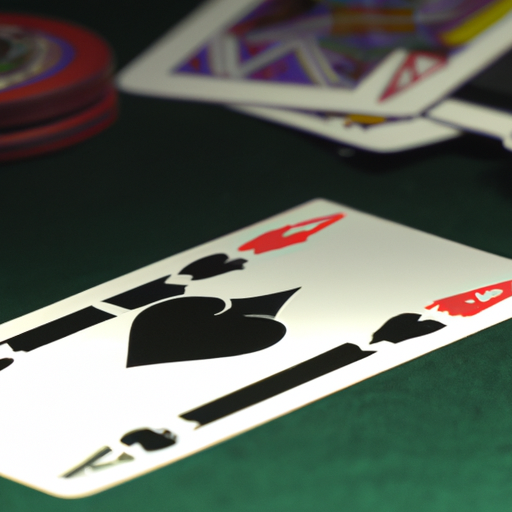
Blackjack is a popular casino game that has been around for hundreds of years. It's a game of ability and strategy, the place gamblers try to beat the seller by getting a hand value of 21 or as close to it as attainable with out going over. Whereas there are various completely different methods that gamblers can use to enhance their chances of winning, one of the most important is probability principle.
Probability principle is the examine of how probably occasions are to happen. In blackjack, this means understanding the odds of getting certain cards and utilizing that info to make better choices about when to hit, stand, double down, or break up. By incorporating probability principle into your betting strategy, you can improve your chances of winning and maximize your profitability.
The first step in incorporating probability principle into your blackjack strategy is to grasp the fundamental possibilities concerned in the game. For instance, there are 16 cards in a standard deck which have a value of 10 (10s, jacks, queens, and kings). Which means there may be a 16/52 (or roughly 31%) probability of getting a 10-value card on any given hand. Equally, there are four aces in a deck, so the probability of getting an ace is 4/52 (or roughly 8%).
As soon as you perceive these fundamental possibilities, you can start utilizing them to make better choices at the blackjack table. For instance, if you have a hand value of 12 and the seller's upcard is a 6, you is likely to be tempted to hit as a result of you don't wish to risk busting by going over 21. Nonetheless, if you know that there are more cards with a value of 10 in the deck than any different card, you would possibly determine to face as a substitute as a result of there's a good probability that the seller will bust by drawing another card.
One other way to include probability principle into your blackjack strategy is by utilizing card counting strategies. Card counting entails protecting track of the cards which were played and utilizing that info to estimate the probability of getting certain cards on future hands. Whereas card counting shouldn't be unlawful, it is frowned upon by casinos and can get you banned if you're caught.
There are a number of completely different card counting systems that you can use, but all of them contain assigning a level value to every card and protecting a working count as the cards are dealt. When the count is high, there are more high-value cards left in the deck, which implies that the player has a better probability of getting a blackjack or winning a hand. When the count is low, there are more low-value cards left in the deck, which implies that the seller has a better probability of winning.
Whereas card counting will be an efficient way to enhance your chances of winning at blackjack, it requires a lot of practice and focus. You additionally want to have the ability to do it discreetly in order that you don't appeal to undesirable consideration from casino employees.
In addition to understanding fundamental possibilities and utilizing card counting strategies, there are different ways to include probability principle into your blackjack strategy. For instance, you can use betting systems like the Martingale system or the Paroli system to regulate your bets based on whether or not you're winning or shedding. These systems contain growing or lowering your bet amount relying on whether or not you've won or lost the earlier hand.
Nonetheless, it's important to keep in mind that no betting system can assure a win at blackjack. The game remains to be finally based on luck, and even when you perceive probability principle and use superior methods like card counting, there's always a probability that you'll lose.
In conclusion, probability principle plays an important position in blackjack strategy. By understanding fundamental possibilities, utilizing card counting strategies, and incorporating betting systems into your strategy, you can improve your chances of winning and maximize your profitability at the blackjack table. Nonetheless, it's important to keep in mind that no strategy can assure a win, and that finally, luck plays a big position in the game.
The Pros and Cons of Using a Progressive Betting System Based mostly on Probability Theory in Blackjack
Blackjack is a popular casino game that has been around for hundreds of years. It's a game of ability and strategy, the place gamblers try to beat the seller by getting a hand value nearer to 21 with out going over. One of the most popular methods used in blackjack is the progressive betting system based on probability principle. This system entails growing or lowering your bet amount based on the probability of winning or shedding the next hand. In this article, we will discover the pros and cons of utilizing this system in blackjack.
The first benefit of utilizing a progressive betting system based on probability principle is that it may also help you handle your bankroll successfully. By adjusting your bet amount based on the probability of winning or shedding, you can decrease your losses and maximize your winnings. This may be particularly helpful for gamblers who're new to blackjack and are nonetheless learning how to play.
One other benefit of utilizing this system is that it may also help you keep focused and disciplined whereas playing blackjack. By following a set of guidelines based on probability principle, you can keep away from making impulsive choices that might result in pricey errors. This may be notably important when playing in a fast-paced setting like a casino, the place distractions are widespread.
Nonetheless, there are additionally some drawbacks to utilizing a progressive betting system based on probability principle in blackjack. One of the biggest disadvantages is that it does not assure success. Whereas probability principle may also help you make more knowledgeable choices about when to extend or lower your bet amount, it can't predict the final result of every hand with 100% accuracy.
One other drawback is that this system requires a important amount of time and effort to implement successfully. It is advisable have a good understanding of probability principle and be capable to calculate the odds precisely in order to make knowledgeable choices about your bets. This may be difficult for some gamblers, particularly those that are new to blackjack or should not have robust math expertise.
In addition, utilizing a progressive betting system based on probability principle will be dangerous if you should not have a massive sufficient bankroll to support it. If you are consistently growing your bet amount based on the probability of winning, you might shortly run out of cash if you hit a shedding streak. Because of this it is important to set reasonable objectives and limits when utilizing this system.
In conclusion, the progressive betting system based on probability principle will be a useful gizmo for managing your bankroll and staying disciplined whereas playing blackjack. Nonetheless, it shouldn't be a assured path to success and requires a important amount of time and effort to implement successfully. Earlier than utilizing this system, it is important to weigh the pros and cons fastidiously and make sure that it aligns with your private objectives and risk tolerance. With the right strategy, this system may also help you turn into a more profitable blackjack player over time.
Exploring the Different Types of Chances Concerned in Enjoying Blackjack
Blackjack is a popular casino game that has been around for hundreds of years. It's a game of ability and strategy, the place gamblers try to beat the seller by getting a hand value nearer to 21 with out going over. One of the key components of blackjack strategy is knowing probability principle.
Probability principle is the department of arithmetic that deals with the probability of occasions occurring. In blackjack, there are a number of differing types of possibilities that gamblers must be conscious of in order to make knowledgeable choices.
The first type of probability is the probability of being dealt a certain hand. For instance, there are four fits in a deck of cards (hearts, diamonds, clubs, and spades), and every suit has 13 cards (ace via king). Which means there are 52 cards in total, and every card has an equal probability of being dealt.
Nonetheless, the probability of being dealt a specific hand (reminiscent of two queens) is way decrease. There are only four queens in the deck, so the probability of being dealt two queens is calculated by multiplying the probability of getting one queen (4/52) by the probability of getting another queen (3/51). This gives us a probability of 0.0045 or 0.45%.
The second type of probability is the probability of busting. When a player's hand exceeds 21, they lose robotically. The probability of busting relies on the value of their current hand and the seller's upcard.
For instance, if a player has a hand value of 12 and the seller's upcard is a 6, they've a high probability of busting in the event that they hit (take another card). It is because there are various cards in the deck that will trigger them to exceed 21 (any card valued at 10).
On the different hand, if a player has a hand value of 17 and the seller's upcard is a 2, they've a low probability of busting in the event that they hit. It is because there are various cards in the deck that will enhance their hand (any card valued at 4 or decrease).
The third type of probability is the probability of winning a hand. This relies on the player's hand value and the seller's upcard. If the player's hand value is nearer to 21 than the seller's, they win. If the seller's hand exceeds 21, the player wins regardless of their own hand value.
The probability of winning a hand will be calculated utilizing fundamental strategy charts, which provide gamblers with advisable actions based on their current hand and the seller's upcard. These charts are based on mathematical calculations that take into account all attainable outcomes.
In addition to those three varieties of possibilities, there are additionally different components that may have an effect on a player's chances of winning in blackjack. These include the quantity of decks in play, whether or not or not the seller hits on mushy 17, and whether or not or not gamblers are allowed to double down after splitting.
Understanding probability principle is important for growing a profitable blackjack strategy. By understanding the probability of certain occasions occurring, gamblers can make knowledgeable choices about when to hit, stand, double down, or break up. They also can calculate their anticipated return on funding (ROI) and regulate their betting accordingly.
Whereas there isn't any assured way to win at blackjack (or any casino game), understanding probability principle can give gamblers an edge over those that rely solely on luck or instinct. Through the use of fundamental strategy charts and making knowledgeable choices based on possibilities, gamblers can improve their chances of winning and decrease their losses over time.
The Role of Conditional Probability in Advanced Blackjack Strategies
Blackjack is one of the most popular casino video games in the world. It's a game of ability and strategy, the place gamblers try to beat the seller by getting a hand that's nearer to 21 with out going over. Whereas luck plays a position in the game, it's attainable to enhance your chances of winning by utilizing superior blackjack methods.
One of the key ideas in superior blackjack methods is probability principle. Probability principle is the department of arithmetic that deals with the probability of occasions occurring. In blackjack, probability principle will be used to calculate the odds of certain cards being dealt and to make choices based on these odds.
Conditional probability is a specific type of probability that's notably helpful in blackjack. Conditional probability is the probability of an occasion occurring on condition that another occasion has already occurred. In blackjack, this means calculating the probability of getting a certain card based on what cards have already been dealt.
For instance, let's say you're playing blackjack and you're dealt an ace and a six, for a total of seven. The seller's upcard is a ten. You already know that there are four aces left in the deck, so what are the chances of getting an ace in your next card?
To calculate this, you want to make use of conditional probability. The probability of getting an ace in your next card relies on what cards have already been dealt. Since you know that there are four aces left in the deck and 49 cards remaining (assuming a standard deck), the probability of drawing an ace is 4/49 or roughly 8%.
Nonetheless, if you take into account what cards have already been dealt, the probability modifications. If you've seen a number of low-value cards come out already, then there's a greater probability that an ace will be drawn next as a result of there are more high-value cards left in the deck. On the different hand, if you've seen a number of high-value cards come out already, then there's a decrease probability that an ace will be drawn next as a result of there are more low-value cards left in the deck.
Using conditional probability, you can make choices about whether or not to hit or stand based on the probability of getting a certain card. For instance, if you have a total of 16 and the seller's upcard is a six, you is likely to be tempted to face as a result of you don't wish to risk going over 21. Nonetheless, if you know that there are a lot of low-value cards left in the deck, then hitting is likely to be the better option as a result of there's a greater probability of getting a card that won't bust your hand.
After all, calculating possibilities in real-time throughout a game of blackjack is easier stated than done. That's why superior blackjack gamblers spend hours training and memorizing fundamental strategy charts that inform them what to do in completely different conditions based on the seller's upcard and their own hand.
However even when you're not a sophisticated blackjack player, understanding probability principle may also help enhance your game. By understanding the odds of certain cards being dealt and how these odds change based on what cards have already been played, you can make more knowledgeable choices about when to hit, stand, double down, or break up.
In conclusion, probability principle plays a essential position in superior blackjack methods. Through the use of conditional probability to calculate the probability of certain cards being dealt based on what cards have already been played, gamblers can make more knowledgeable choices about how to play their hands. Whereas it takes practice and memorization to turn into an expert at utilizing probability principle in blackjack, even informal gamblers can profit from understanding these ideas.
Using Bayesian Inference to Improve Your Resolution-Making Expertise at the Blackjack Table
Blackjack is a popular casino game that has been around for hundreds of years. It's a game of ability and strategy, the place gamblers try to beat the seller by getting a hand that's nearer to 21 than the seller's hand with out going over. Whereas there are various completely different methods that gamblers can use to enhance their chances of winning, one of the most efficient is utilizing probability principle.
Probability principle is the department of arithmetic that deals with the examine of random occasions. In blackjack, probability principle will be used to calculate the probability of certain outcomes based on the cards which have already been dealt. By understanding these possibilities, gamblers can make more knowledgeable choices about when to hit, stand, or double down.
One way to make use of probability principle in blackjack is thru Bayesian inference. Bayesian inference is a statistical method that enables you to update your beliefs about an occasion based on new info. In blackjack, this means updating your beliefs about what cards are left in the deck based on the cards which have already been dealt.
For instance, let's say you are playing blackjack and you are dealt a 10 and a 6, for a total of 16. The seller's up card is a 7. Based mostly on this info, you would possibly determine to hit as a result of you know that there are nonetheless many cards in the deck that might assist you get nearer to 21.
Nonetheless, if you have been utilizing Bayesian inference, you would take into account not only the cards which have already been dealt but additionally your prior beliefs about what cards are left in the deck. For instance, if you had been counting cards and knew that there have been many high-value cards left in the deck, you would possibly determine to not hit as a result of there may be a greater probability of busting.
Bayesian inference can be used to make choices about when to double down or break up pairs. For instance, if you have two eights and the seller's up card is a six, you is likely to be tempted to separate the pair. Nonetheless, if you have been counting cards and know that there are various low-value cards left in the deck, you would possibly determine to not break up as a result of there may be a greater probability of getting two low-value hands.
After all, utilizing probability principle in blackjack shouldn't be foolproof. There is always a component of probability concerned, and even the finest gamblers can lose. Nonetheless, by utilizing Bayesian inference and different probability-based methods, gamblers can enhance their determination-making expertise and improve their chances of winning.
In addition to utilizing probability principle, there are different methods that gamblers can use to enhance their chances of winning at blackjack. For instance, some gamblers use card counting strategies to keep track of which cards have already been dealt and regulate their bets accordingly. Others use fundamental strategy charts to find out when to hit, stand, or double down based on the seller's up card.
In the end, the key to success in blackjack is a combination of ability, strategy, and luck. Through the use of probability principle and different methods, gamblers can enhance their odds of winning and enjoy this classic casino game even more. So next time you sit down at the blackjack table, bear in mind to keep your wits about you and use all the instruments at your disposal to come back out forward.
How Monte Carlo Simulation Can Help You Test Your Blackjack Strategies Based mostly on Probability Theory
Blackjack is a popular casino game that has been around for hundreds of years. It's a game of ability and strategy, the place gamblers try to beat the seller by getting a hand value nearer to 21 with out going over. Whereas there are various completely different methods that gamblers can use to enhance their chances of winning, one of the most important is probability principle.
Probability principle is the examine of random occasions and the probability of their prevalence. In blackjack, probability principle will be used to find out the odds of certain outcomes based on the cards which have already been dealt. This info can then be used to make more knowledgeable choices about when to hit, stand, or double down.
One way that probability principle will be utilized in blackjack strategy is thru Monte Carlo simulation. Monte Carlo simulation is a mathematical method that makes use of random sampling to simulate real-world eventualities. In blackjack, this method will be used to check completely different methods and see how they carry out over hundreds and even millions of hands.
To use Monte Carlo simulation in blackjack strategy, gamblers first must develop a set of guidelines for their strategy. This would possibly include issues like when to hit or stand based on the seller's up card, when to double down, and when to separate pairs. As soon as these guidelines have been established, gamblers can then use software programs or online simulators to run simulations and see how their strategy performs over time.
One benefit of utilizing Monte Carlo simulation in blackjack strategy is that it permits gamblers to check their methods in a risk-free setting. As a substitute of risking real cash at the casino, gamblers can run simulations and see how their methods carry out over hundreds and even millions of hands. This may also help them determine weaknesses in their strategy and make changes before they start playing for real cash.
One other benefit of utilizing Monte Carlo simulation in blackjack strategy is that it permits gamblers to see how completely different variables have an effect on their efficiency. For instance, gamblers can take a look at how their strategy performs in opposition to differing types of dealers or with completely different numbers of decks. This may also help them develop more sturdy methods which are better suited to completely different playing conditions.
After all, there are some limitations to utilizing Monte Carlo simulation in blackjack strategy. For one factor, simulations are only as good as the guidelines and assumptions which are used to create them. If gamblers make unrealistic assumptions or use flawed guidelines, their simulations could not precisely mirror real-world outcomes.
Moreover, whereas Monte Carlo simulation may also help gamblers determine weaknesses in their strategy, it can't assure success at the casino. Blackjack remains to be a game of probability, and even the finest methods will not win each hand. Nonetheless, by utilizing probability principle and Monte Carlo simulation to tell their choices, gamblers can enhance their chances of winning over the long run.
In conclusion, probability principle plays an important position in blackjack strategy. By understanding the odds of certain outcomes based on the cards which have already been dealt, gamblers can make more knowledgeable choices about when to hit, stand, or double down. Moreover, by utilizing Monte Carlo simulation to check their methods in a risk-free setting, gamblers can determine weaknesses and make changes before they start playing for real cash. Whereas there are limitations to utilizing Monte Carlo simulation in blackjack strategy, it stays a priceless instrument for severe gamblers who wish to enhance their chances of winning at the casino.
The Future of Probability Theory and Its Impact on the Evolution of Blackjack Strategy
Blackjack is one of the most popular casino video games in the world, and it has been played for hundreds of years. The game is simple to grasp, but mastering it requires a lot of ability and strategy. One of the key components of blackjack strategy is probability principle.
Probability principle is a department of arithmetic that deals with the examine of random occasions. It helps us to grasp the probability of certain outcomes and to make knowledgeable choices based on that info. In blackjack, probability principle plays a essential position in figuring out the finest course of action in any given scenario.
The fundamental premise of blackjack is to get as close to 21 factors as attainable with out going over. Every player is dealt two cards, and they will select to hit (take another card) or stand (keep their current hand). The seller additionally receives two cards, but only one is face-up. The aim is to beat the seller's hand with out going over 21.
To decide the finest course of action in any given scenario, gamblers should contemplate a number of components, including their own hand, the seller's up-card, and the quantity of decks being used. Probability principle comes into play when calculating the odds of drawing certain cards and making certain hands.
For instance, if a player has a hand totaling 12 factors and the seller's up-card is a 6, probability principle tells us that there's a high probability that the seller will bust (go over 21) in the event that they hit. Therefore, it could also be advantageous for the player to face on their current hand reasonably than risk going over 21 themselves.
One other important side of blackjack strategy that depends closely on probability principle is card counting. Card counting entails protecting track of which cards have already been played in order to find out which ones are more prone to be dealt next. This info can then be used to make more knowledgeable choices about when to hit or stand.
Whereas card counting shouldn't be unlawful, it is frowned upon by casinos and may result in being banned from the premises. Nonetheless, there are different strategies of utilizing probability principle to gain a bonus in blackjack, reminiscent of utilizing fundamental strategy charts.
Basic strategy charts provide gamblers with a set of pointers for how to play every hand based on the seller's up-card and the quantity of decks being used. These charts are based on mathematical calculations that take into account the possibilities of drawing certain cards and making certain hands.
The future of probability principle in blackjack strategy is bright. As expertise continues to advance, we will anticipate to see more refined algorithms and computer programs that may analyze huge quantities of information and make more correct predictions about the outcomes of every hand.
In addition, as more states legalize online playing, we will anticipate to see a rise in the use of synthetic intelligence (AI) in blackjack strategy. AI algorithms can be taught from previous video games and regulate their methods accordingly, making them even more efficient at predicting outcomes and making knowledgeable choices.
Total, probability principle plays a essential position in blackjack strategy. By understanding the probability of certain outcomes and utilizing that info to make knowledgeable choices, gamblers can improve their chances of winning at this popular casino game. As expertise continues to evolve, we will anticipate to see even more superior applications of probability principle in blackjack strategy.
Common Misconceptions About Probability Theory and How They Affect Your Strategy to Enjoying Blackjack
Blackjack is a popular casino game that has been around for hundreds of years. It's a game of ability and strategy, the place gamblers try to beat the seller by getting a hand value nearer to 21 with out going over. One of the most important features of playing blackjack is knowing probability principle and how it impacts your strategy to the game.
Sadly, there are various misconceptions about probability principle that may lead gamblers astray. For instance, some people believe that if they've lost a number of hands in a row, they're due for a win. This is called the gambler's fallacy and it will be very dangerous when playing blackjack.
The fact is that every hand of blackjack is an impartial occasion. The final result of one hand has no impact on the final result of the next hand. Therefore, simply because you have lost a number of hands in a row does not mean you are due for a win. Every hand has its own set of possibilities and ought to be handled as such.
One other widespread false impression about probability principle in blackjack is that card counting is against the law or unethical. Whereas some casinos could frown upon card counting, it shouldn't be unlawful or unethical. Card counting simply entails protecting track of the cards which were dealt in order that you can make more knowledgeable choices about your next transfer.
Card counting will be a very efficient strategy when used appropriately. Nonetheless, it requires a lot of practice and ability to master. It additionally requires a deep understanding of probability principle and how it applies to blackjack.
One important idea in probability principle that applies to blackjack is anticipated value (EV). EV refers to the average amount you can anticipate to win or lose on every bet over time. In blackjack, your EV relies on components reminiscent of the guidelines of the game, the quantity of decks being used, and your own ability degree.
For instance, if you are playing a game with favorable guidelines and utilizing fundamental strategy appropriately, your EV could also be barely optimistic. Which means over time, you can anticipate to win barely more than you lose. On the different hand, if you are playing a game with unfavorable guidelines and making poor choices, your EV could also be adverse. Which means over time, you can anticipate to lose more than you win.
Understanding EV is important as a result of it may also help you make more knowledgeable choices about when to hit, stand, double down, or break up. For instance, if the seller has a 6 exhibiting and you have a total of 10, fundamental strategy dictates that you ought to double down. It is because the probability of getting a high card (10 or greater) is comparatively high in this scenario. By doubling down, you improve your potential winnings and enhance your general EV.
In conclusion, understanding probability principle is important for anyone who desires to play blackjack at a high degree. It will probably assist you keep away from widespread misconceptions and make more knowledgeable choices about when to hit, stand, double down, or break up. Whether or not you are a newbie or an skilled player, taking the time to study probability principle can enormously enhance your chances of winning at blackjack.
Q&A
1. What is probability principle?
Probability principle is a department of arithmetic that deals with the examine of random occasions and their probability of prevalence.
2. How does probability principle apply to blackjack strategy?
Probability principle will be used to calculate the odds of certain outcomes in blackjack, reminiscent of the probability of drawing a certain card or winning a hand.
3. What is the fundamental strategy in blackjack?
The fundamental strategy in blackjack entails making choices based on the player's hand and the seller's upcard, with the aim of maximizing the player's chances of winning.
4. How does probability principle assist in figuring out the fundamental strategy in blackjack?
Probability principle will be used to find out which choices are most prone to consequence in a win for the player, based on the cards which have already been dealt and those who stay in the deck.
5. What is card counting?
Card counting is a method used by some gamblers to keep track of which cards have been dealt and which stay in the deck, in order to make more knowledgeable choices about their bets and playing strategy.
6. How does probability principle relate to card counting?
Probability principle will be used to calculate the anticipated value of completely different betting methods based on the cards which were counted, permitting gamblers to make more knowledgeable choices about when to bet and how a lot.
7. What is variance in blackjack?
Variance refers to the diploma of randomness or unpredictability in a game of blackjack, which can have an effect on each quick-time period and long-time period outcomes for gamblers.
8. How does probability principle assist handle variance in blackjack?
Probability principle will be used to calculate anticipated values and standard deviations for various betting methods, serving to gamblers handle their bankroll and decrease losses attributable to variance.
9. What is risk administration in blackjack?
Threat administration entails making strategic choices about how a lot cash to bet and when, based on an evaluation of potential dangers and rewards.
10. How does probability principle inform risk administration methods in blackjack?
Probability principle will be used to calculate the anticipated value and variance of completely different betting methods, permitting gamblers to make more knowledgeable choices about how a lot to bet and when.
11. What is the Kelly criterion in blackjack?
The Kelly criterion is a mathematical formulation used to find out the optimum measurement of a bet based on the player's edge over the home and their bankroll.
12. How does probability principle relate to the Kelly criterion in blackjack?
Probability principle is used to calculate the player's edge over the home, which is a key enter into the Kelly criterion formulation.
13. What is Monte Carlo simulation in blackjack?
Monte Carlo simulation entails utilizing random sampling strategies to simulate completely different outcomes in a game of blackjack, in order to estimate possibilities and anticipated values for various betting methods.
14. How does probability principle relate to Monte Carlo simulation in blackjack?
Probability principle provides the underlying mathematical framework for Monte Carlo simulation, permitting gamblers to estimate possibilities and anticipated values based on simulated outcomes.
15. What are some widespread misconceptions about probability principle in blackjack strategy?
Common misconceptions include assuming that previous outcomes have an effect on future outcomes (often called the gambler's fallacy), or believing that card counting ensures a win (when in truth it only improves the player's odds).
Conclusion
Probability principle plays a essential position in growing efficient blackjack methods. By understanding the probability of certain outcomes, gamblers can make knowledgeable choices about when to hit, stand, or double down. Probability calculations additionally assist gamblers decide the optimum bet amount and handle their bankroll successfully. Total, a strong understanding of probability principle is important for any severe blackjack player looking to enhance their chances of winning.



